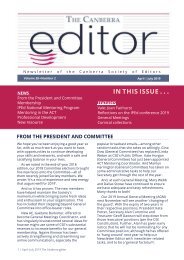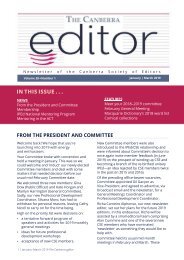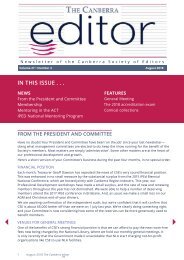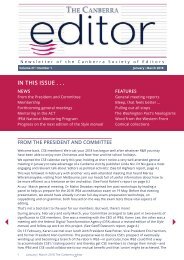ACTive Voice issue 3 2021
Create successful ePaper yourself
Turn your PDF publications into a flip-book with our unique Google optimized e-Paper software.
Book review
Working words by Elizabeth Manning Murphy Revised edition (Lacuna, 2019) x + 257 pp. ISBN 9781922198365
(paperback); ISBN 9781922198372 (ebook)
Reviewer: John Linnegar, Accredited Professional Text Editor, Director, Professional Editors’ Guild NPO (South
Africa), Chairperson, SENSE (Netherlands)
I was fortunate enough to have met the author of the first edition of Working Words in 2012, barely a year after it
was published. On reading the collection of ‘chats’ previously aimed at members of the Canberra Society of
Editors, what impressed me instantly was how redolent those chats are of the author’s voice and outlook on her
craft as a consummate text editor. In fact, of her persona: this is unmistakeably Elizabeth Manning Murphy from
beginning to end, whether it’s her solid linguistic foundations, her vast editorial experience, her travel-savvy
advice to editors on the wing or her sometimes wry sense of humour or turn of phrase.
The series of 63 chats that form this compendium = are grouped broadly into eight parts, each dealing with an
important facet of the text editor’s craft –especially that of the freelancer. These parts range from the craft of
editing and editing as a business via the ethical and legal considerations inherent in improving authors’ texts to
the nitty-gritty of grammar, spelling, word usage, punctuation, plain language and style. In this gem of a resource,
this seasoned editor turned author about editing covers the entire gamut of the text editor’s craft and business
with both thoroughness and aplomb. And she does so in the most accessible and personable of styles. Indeed,
Working words spends precious little of my waking hours idly on my bookshelf – the fact that it’s my heavily
thumbed and bookmarked vade mecum speaks volumes.
Having received the revised edition recently, I was naturally curious to discover just how ‘revised’ it is. After all,
the wisdom that fills its pages is timeless. But much has changed in the eight plus years since the chats were first
written and the collection was published.
My impression is that the morphing of the original volume into the current revision has been deftly handled, in a
number of respects. For starters, the design is slimmer, more compact, perhaps even more contemporary in its
look and feel while remaining unmistakeably the Working words we are so familiar with: justified text, unspaced
paragraphs with first lines indented, the spaced en-rule having replaced the unspaced em-rule as a dash, and so
on.
In the text itself, the changes have been subtle though necessary to keep the book relevant to a new generation
of readers. Here, author and editor (and associates) have clearly taken cognisance of the technological changes
that have occurred since 2003–2011, when the chats were penned. And so ‘working online’ is now ‘working on
screen’, ‘flashdrives’ are now augmented by ‘external drives’ and ‘the cloud’, and references to redundant
software (eg Publisher) have either been deleted or replaced with more current products; in addition, references
to ‘Wifi in hotel rooms’ and ‘video-conferencing facilities for use for worldwide training and discussions’ serve to
bring the chats right up to date. It has also been necessary to update references to MS Word functionality (eg
using Track Changes) to reflect upgrades since Word 2000 and Windows 98 (ancient history to Millennials), for
instance. The author has added the URLs of a number of online references in the text (some of them only recently
available online), which is another useful feature of this edition. And, recognising that the internet has made it
possible for text editors to service clients worldwide, in the Chat on ‘The ethics of editing’, the author has inserted
a reference to editing papers for students of overseas universities, adding the caution that ‘it is important to find
out what degree of editing is allowable in the particular institution’ (at 43). It’s typical of the sound advice that
pervades Manning Murphy’s text.
Perhaps even more interesting to this worker with others’ words, though, is the number of subtle changes
introduced to the word usage in the 2019 edition, because, as the author writes in its preface, ‘some rethinking
was necessary … the English language has moved on and the way we express ourselves has become increasingly
informal, even in formal writing’. So, for example, in Chat 63 ‘Whither grammar and plain English’, the examples
illustrating language change in the 21st century have – sensibly – been updated. One example is the changing
connotation of ‘awesome’ from the original ‘inspiring awe’ to ‘That’s good’. The other is equally apt: ‘absolutely’
is now used to mean total agreement rather than (or in addition to) ‘completely’ or ‘perfectly’. Editors clearly
need to remain alert to such linguistic shifts when engaging with authors’ words, and intervene appropriately.
page 6 of 10 ACTive Voice July August September 2021
















